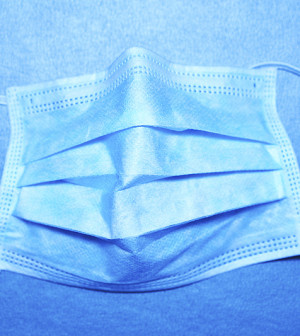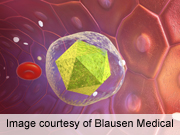- 7 Best Breads for Maintaining Stable Blood Sugar
- Gelatin vs. Collagen: Which is Best for Skin, Nails, and Joints?
- The Long-Term Effects of Daily Turmeric Supplements on Liver Health
- Could Your Grocery Store Meat Be Causing Recurring UTIs?
- Are You Making This Expensive Thermostat Error This Winter?
- Recognizing the Signs of Hypothyroidism
- 10 Strategies to Overcome Insomnia
- Could Artificial Sweeteners Be Aging the Brain Faster?
- Techniques for Soothing Your Nervous System
- Does the Water in Your House Smell Funny? Here’s Why
New Drug Combo Helps Hard-to-Treat Hepatitis C


TUESDAY, Aug. 27Combining an old drug with an experimental one may cure many cases of hard-to-treat hepatitis C — without the harsh side effects of the standard regimen, a U.S. government study finds.
Experts said the study, reported in the Aug. 28 Journal of the American Medical Association, is an important research step. It focused on patients who often do not respond well to the current hepatitis C drug regimen because they already had liver damage, harbored a particularly stubborn strain of the virus or had other “unfavorable treatment characteristics.”
In other words, they were the patients who often are left out of clinical trials.
“This was the real world, and the treatment response was really quite good,” said Dr. Anthony Fauci, director of the U.S. National Institute of Allergy and Infectious Diseases and one of the researchers on the work.
Of the 60 patients in the trial, 48 percent to 68 percent had the virus cleared from their bodies, depending on the drug dose.
The therapy included one older hepatitis C drug, called ribavirin, and one currently being considered for approval in the United States and Europe, called sofosbuvir. Most important, the regimen excluded interferon — an injection drug that is part of the current standard treatment for hepatitis C.
Interferon is difficult to take and can cause side effects including sleep problems, depression, nausea, diarrhea, muscle pain, fever and fatigue. Researchers are working on various interferon-free drug regimens for hepatitis C.
There are dozens of drugs under development, with several expected to be on the market within the next year or two.
That means the best is yet to come, said Dr. Eugene Schiff, a liver disease expert who was not involved in the new trial.
“This is an important paper,” said Schiff, who directs the Center for Liver Diseases at the University of Miami. “But these results reflect an interim experience. It’s a treatment that will be out there for only a short time.”
Schiff said that in the next year and a half, there should be new oral drug combinations that allow hepatitis C patients to skip not only the interferon, but also ribavirin — which can have substantial side effects of its own, including anemia.
“We’re in the middle of an exciting time,” Schiff said. “I’m very optimistic.”
The current study included 60 hepatitis C patients with factors that make standard interferon-based treatment unlikely to work.
Most had a genetic strain of the virus that does not respond well to interferon. Many also had liver fibrosis — scarring of the organ that can progress to more severe damage, known as cirrhosis, and possibly liver cancer. And most participants were black, a group that traditionally has not fared as well with hepatitis C regimens compared to whites.
All of the patients were given sofosbuvir, an oral drug, plus either low-dose ribavirin or a dose adjusted to their weight. After 24 weeks of treatment, 68 percent of those given the weight-based ribavirin had a “sustained virologic response,” which equates to a cure, Schiff said.
Of the patients in the low-dose group, 48 percent were cured.
Headache, anemia, fatigue and nausea were the most common side effects, affecting anywhere from 16 percent to 33 percent of the patients. But none dropped out of treatment due to side effects, the researchers said.
Fauci agreed that drug regimens that bypass both interferon and ribavirin are the wave of the future. “The ultimate goal is to have a drug combination that would be nontoxic and have a high cure rate,” he said.
The drugs under development also are expected to cut the treatment time from up to 48 weeks to 12 weeks or less, Schiff said.
More than 3 million Americans are living with chronic hepatitis C, but most don’t know it, Fauci said. “That’s why there’s a big push for screening,” he said.
U.S health officials recommend that all baby boomers (people born from 1945 to 1965) get tested for chronic hepatitis C infection. The virus is mainly transmitted through infected blood, and injection-drug use is the top risk factor. But people who had a blood transfusion before 1992 also are at risk, because that predated widespread screening for hepatitis C.
In a small number of cases, the virus is passed during sex.
Schiff agreed that people would need to be screened for the new drug regimens to effectively prevent cases of liver cirrhosis and cancer. Only a small number of people with chronic hepatitis C develop those complications, but there is no way to predict any one person’s course.
Treating all those people with the new drugs coming to market will be expensive, Schiff said. “But it’s highly likely they’ll be cured,” he added. “And you’ll be curing a disease that causes cirrhosis and cancer.”
More information
The U.S. Centers for Disease Control and Prevention has more on hepatitis C.
Source: HealthDay
Copyright © 2026 HealthDay. All rights reserved.










